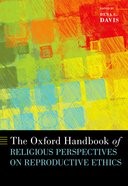 The Oxford Handbook of Religious Perspectives on Reproductive Ethics
The Oxford Handbook of Religious Perspectives on Reproductive Ethics
Contents
-
-
-
-
-
-
-
-
-
-
-
-
Origin of Issue Origin of Issue
-
Historical—Medical Background Historical—Medical Background
-
The Initial Scholarly Debate The Initial Scholarly Debate
-
Responses Responses
-
Embryo Rescue Embryo Rescue
-
Embryo Adoption Embryo Adoption
-
Surrogacy Surrogacy
-
Procreative Infidelity Procreative Infidelity
-
Embryo Adoption Acceptable in Principle, but Still Morally Wrong? Embryo Adoption Acceptable in Principle, but Still Morally Wrong?
-
Further Moral Considerations with Regard to Embryo Adoption Further Moral Considerations with Regard to Embryo Adoption
-
Notes Notes
-
Bibliography Bibliography
-
-
-
-
-
-
-
-
-
-
-
15 Adopting Embryos
Get accessJohn Berkman is professor of moral theology at Regis College, University of Toronto, at the Graduate Centre for Theological Studies in the Toronto School of Theology, and a fellow of the International Society for Science and Religion. He previously taught at the Dominican School of Philosophy & Theology in Berkeley, California, and was director of the Division of Moral Theology/Ethics at the Catholic University of America. He has been a visiting professor at Duke Divinity School, a visiting fellow at Christ Church College, Oxford, and a visiting research scholar at the Aquinas Institute at Blackfriars, Oxford. He teaches and writes in the areas of Thomistic ethics, healthcare ethics, and animal ethics. He recently published “G.E.M. Anscombe’s ‘I am Sadly Theoretical: It Is the Effect of Being at Oxford’ (1938): A Newly Discovered Article by Anscombe Edited and with an Editor’s Introduction” in New Blackfriars in September 2021, and is editing The Oxford Handbook of Theological Bioethics. Many of his publications can be found at his academia.edu and researchgate.net webpages.
-
Published:19 September 2024
Cite
Abstract
For over twenty-five years, the relatively rare but now growing practice of embryo adoption has engendered what at first glance appears to be an outsized moral debate amongst Catholic ethicists. In embryo adoption, a woman undergoes embryo transfer. A previously frozen human embryo is transferred to her uterus, and then she gestates it to delivery. A number of competing moral descriptions of the practice have been proposed and defended: rescue, adoption, surrogacy, or infidelity. One reason this question has received such extensive moral analysis (or “casuistry”) is that Catholic ethicists early on recognized that the question could not be readily resolved using existing moral categories within that tradition. In other words, a conclusive moral evaluation of the practice would entail a development of moral doctrine. The alternative moral descriptions constitute competing paradigms through which to see and evaluate the practice. This chapter provides a moral analysis of these competing paradigms, and suggests possible new directions.
Sign in
Personal account
- Sign in with email/username & password
- Get email alerts
- Save searches
- Purchase content
- Activate your purchase/trial code
- Add your ORCID iD
Purchase
Our books are available by subscription or purchase to libraries and institutions.
Purchasing information| Month: | Total Views: |
|---|---|
| September 2024 | 2 |
| November 2024 | 3 |
| January 2025 | 3 |
| February 2025 | 3 |
| March 2025 | 2 |
| April 2025 | 2 |
Get help with access
Institutional access
Access to content on Oxford Academic is often provided through institutional subscriptions and purchases. If you are a member of an institution with an active account, you may be able to access content in one of the following ways:
IP based access
Typically, access is provided across an institutional network to a range of IP addresses. This authentication occurs automatically, and it is not possible to sign out of an IP authenticated account.
Sign in through your institution
Choose this option to get remote access when outside your institution. Shibboleth/Open Athens technology is used to provide single sign-on between your institution’s website and Oxford Academic.
If your institution is not listed or you cannot sign in to your institution’s website, please contact your librarian or administrator.
Sign in with a library card
Enter your library card number to sign in. If you cannot sign in, please contact your librarian.
Society Members
Society member access to a journal is achieved in one of the following ways:
Sign in through society site
Many societies offer single sign-on between the society website and Oxford Academic. If you see ‘Sign in through society site’ in the sign in pane within a journal:
If you do not have a society account or have forgotten your username or password, please contact your society.
Sign in using a personal account
Some societies use Oxford Academic personal accounts to provide access to their members. See below.
Personal account
A personal account can be used to get email alerts, save searches, purchase content, and activate subscriptions.
Some societies use Oxford Academic personal accounts to provide access to their members.
Viewing your signed in accounts
Click the account icon in the top right to:
Signed in but can't access content
Oxford Academic is home to a wide variety of products. The institutional subscription may not cover the content that you are trying to access. If you believe you should have access to that content, please contact your librarian.
Institutional account management
For librarians and administrators, your personal account also provides access to institutional account management. Here you will find options to view and activate subscriptions, manage institutional settings and access options, access usage statistics, and more.